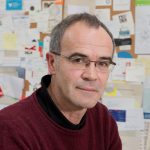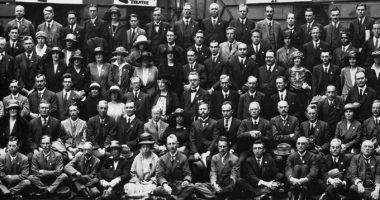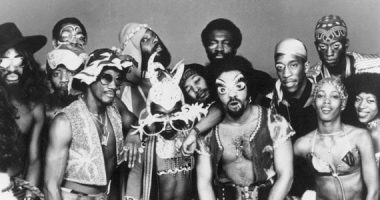
Pitt Rivers Museum | The Ewan | CC BY-SA
In these times of interconnected crises, no knowledge seems dispensable. To face the present and get a glimpse of the future, we need to open up the dialogue between different disciplines, from modern science to ancestral knowledge, including the new theories of the Anthropocene.
The Northwest Passage
When, in the early 1990s, Michel Serres used the metaphor of “the Northwest Passage”[1] to illustrate the arduous transition between the human sciences and the sciences of the material world, this sea route that runs through the Artic to connect the Atlantic and Pacific oceans was covered in ice for the most part of the year. Three decades later, the scenario has radically changed – the sea ice has rapidly retreated, polar bears are drifting away on our mobile phone screens, ever more alarming scientific reports are being published, the international dispute over the area’s resources has kicked off, the “sixth extinction”[2] is speeding up… The theories, diagnoses, solutions and laws may have been too late in arriving, but there is a perverse irony. While the thawing of the Arctic is having devastating effects on the region’s biodiversity, the dispute between the exact sciences and the human sciences – that modern dichotomy between “the two cultures” set out by C.P. Snow in the 1950s – seems to be liquefying, or at least there are now passages that allow for smoother sailing. There are various reasons for this new intellectual landscape, although the two cultures still stand separate in the corridors of education, in the processes through which knowledge is transmitted and in the mental matrices with which the mass media operate.
One of the great novelties of the 21st century is the progressive spread of the term “Anthropocene,” chosen by the winner of the Nobel Prize in Chemistry Paul Crutzen to characterise this period of history in which the human species has become a geological force capable of substantially altering the biosphere. It is a conceptual earthquake of a magnitude that we are still grappling to understand, but it has allowed the irruption of a considerable theoretical corpus[3] in which the boundaries between disciplines have become blurred. A healthy contamination is spreading between the sciences and the humanities, although the unstoppable specialisation continues to increase. Thinkers, scientists, artists, writers, journalists, cultural managers, activists, etc. are amplifying the great chessboard of human knowledge, questioning some of our most solid convictions and beliefs, placing us before an extraordinary cultural disruption. We are forced into an open, systematic and fluid questioning of the ways in which we understand and make worlds. The seismic shift is epistemological and ontological, it permeates science and art, technologies and economies; the Anthropocene disrupts geopolitics, plunges us into geological time and confronts us with a crossroads where all the knowledge we have acquired does not seem sufficient to stop a long-predicted collapse.[4]
Planet Earth, our common home, is burning. And it is only now, when we are beginning to “think of ourselves as a planet,”[5] that we are becoming aware of our complete dependence on all forms of life. In this cruel paradox, the mass extermination of species comes alongside a progressive recognition of non-human intelligences (plants and animals); while the desert spreads, AI, the philosopher’s stone of the Dataists, promises new panaceas. Singularists, accelerationists, post-humanists, transhumanists and most-humanists are all running around a boiling planet, each current with its exegetes and its corresponding idiolects in search of a differential approach, while their ideas intertwine, overlap and blend together. The accelerationists believe that the solution is to bring about the implosion of cognitive capitalism. The singularists argue that we must prepare for the moment when machines take over. The post-humanists don’t reject all that is human, but they see it as an outdated stage of our cultural evolution. The transhumanists seek the ultimate fusion of humanity and technology, while the most humanistic yearn for a new Enlightenment.
ARVE Error: src mismatch
url: https://www.youtube.com/watch?v=h9G4BZlnnA4
src in: https://www.youtube-nocookie.com/embed/h9G4BZlnnA4?feature=oembed&enablejsapi=1&origin=https://lab.cccb.org
src gen: https://www.youtube-nocookie.com/embed/h9G4BZlnnA4Actual comparison
url: https://www.youtube.com/watch?v=h9G4BZlnnA4
src in: https://www.youtube-nocookie.com/embed/h9G4BZlnnA4?enablejsapi=1&origin=https%3A%2F%2Flab.cccb.org
src gen: https://www.youtube-nocookie.com/embed/h9G4BZlnnA4
A comprehensive culture?
The truth is that the new “isms” of the 21st century may be insufficient to map the new territory of human knowledge generated by interconnected global crises. Knowledge does not make you wise.[6] Perhaps what continues to emerge, to help bring about a less dystopian horizon, is the consideration of all the types of knowledge that the modern world may have displaced, hidden or excluded. We have already seen how the last century, with its ideals of reason, science and progress, was marked by two world wars with a hundred million dead, the processes of decolonisation and the recovery of the knowledge of colonised peoples, an arms race characterised by mutually assured destruction, and finally by a global ecological crisis. In the third decade of the 21st century, it seems that no type of knowledge is dispensable.
When Sigmund Freud asked C.G. Jung to help him create “a bulwark against the black tide of occultism,”[7] he could not have imagined that both the historical avant-garde and 20th-century popular culture would deny his wishes, even while exalting his person. We need only think of the influential heterodoxy of the surrealists, where Marx and Freud coexist with the Tarot Arcana, astral journeys to Mars, secret societies and the Marquis de Sade. Or notice how many of the superheroes and supervillains in comics, video games and films are in some way plundered from the mythological pantheons of all cultures. Something that may naturally make us suspect that everything that has been excluded, discredited or ignored over the last few centuries has not sunk into complete oblivion.
The archaeology of our consciousness allows us to incorporate all the stages of knowledge and turn them into a comprehensive knowledge or knowledges where each stratum works by recursivity and contingency.[8] In other words, by going back to each other and reappearing as something unthinkable, unexpected, unprecedented, ominous or sublime… The Anthropocene has violently opened the floodgates of our true cognitive situation – thinking of ourselves on large temporal and cosmic scales is a privileged situation that forces us to admit that the history of the universe and human history should be studied together. Advances in our knowledge of the brain allow us to explore the layers of consciousness and unconsciousness that continue to operate in agency, decision-making and free will. All of which will help is to rethink where we want to end up, what we seek as a species and the direction in which we are going. We are still at the top of the food chain. We are predators, perhaps the most fearsome.
The treasure of attention
It is possible that 21st century culture can be redeemed by the re-enchantment of the world, the emancipatory powers of the feminist revolution, intense traffic between science and the humanities, and the creativity or resilience of earthly peoples,[9] but the influence of hegemonic forces at work in the ideas economy, the attention economy and the cognitive economy cannot be ignored.
Data has become the most valuable raw material. The big tech platforms are competing in a frenetic race with the goal focused on our attention span, in other words the time we spend on an endless stream of ephemeral stimuli and constant interruptions or the time our brains would need to process and shape other possible worlds and futures.
We are already datified, controlled, watched, advised and enticed by the innovations and applications of the cybernetic revolution and its latest phase, AI, with all its remarkable advantages and obvious dangers. However, it would be a mistake to continue moaning about the responsibility of this exponentially disruptive technology for a possible “cognitive apocalypse.”[10] The problem lies in how we use it, the way we can regulate or deregulate it, the ethics or biases with which it is programmed, and the local and global consensuses that are established around its speed, applications and democratic access.
We are asking too much of our most complex organ, the brain. With all its prodigious functions acquired over many thousands of years of evolutionary learning, it too has its limits, just like our planet. The human brain cannot process the overwhelming amount of information we subject it to. We not only ask it to reveal its secrets and study itself, replicating itself in a fabulous exercise of metacognition, but also to continue to perform its primary functions, such as regulating our digestive and hormonal health, coordinating and sharpening the five senses, receiving information on the bacteria and viruses that inhabit us, controlling restful sleep and monitoring every breath and every heartbeat.
You don’t need to be an expert to realise that this cognitive overload is making our bodies sick. Nor should we be surprised by the proliferation of therapies and meditation techniques, healthy diets for all tastes, including the digital diets that are essential to stop the rise of mental health disorders[11] that are often treated with a battery of drugs, which are always readily available.
We are witnessing the final battle – the one waged in our consciousness and unconsciousness. Human thought pitted against itself in a landscape of “black boxes.”[12] Is it still possible to imagine that the ever-postponed union of Science and Spirit will recover Ariadne’s thread and allow us to extricate ourselves from the labyrinth? Perhaps we should establish new relations with the Minotaur. Come up with stories, dialogues, pacts and contracts that will help us to better understand the monsters we have created. Too many things are at stake to explain with certainty the future that is already here.
Are we ready to fulfil our commitment to future generations? The world’s 1.9 billion children are not responsible for the “mass extinction.” Giving them back their souls, their powers of imagination and the treasure of attention is a task that cannot be postponed.
[1] Michel Serres. Hermès V: le passage du Nord-Ouest. Éditions de Minuit, 1980.
[2] In his book All Art is Ecological (Penguin UK, 2021), Timothy Morton considers the ideas of “climate change” and “global warming” to be too mild, suggesting the more radical term “mass extinction.”
[3] To attempt a brief list of relevant authors linked to the Anthropocene would be a daunting exercise; the bibliography is enormous, it is constantly growing and there are numerous ways to access it. Nevertheless, the following is a possible selection: Rachel Carson, Gregory Bateson, Michel Serres, Lynn Margulis, James Lovelock, Bruno Latour, Isabelle Stengers, Peter Sloterdjik, Donna Haraway, Timothy Morton, Rosi Braidotti, Stefano Mancuso, Kim Stanley Robinson, McKenzie Ward, William E. Connolly, Paul Mason, Hope Jahren, Viveiros de Castro.
[4] The topic has become so recurrent in this century that it has its own neologism – “collapsology” Collapsology – Wikipedia
[5] See the audiovisual prologue by Kim Stanley Robinson in the exhibition “After the End of the World” (CCCB, 2017).
[6] One may be learned or an authoritative expert in one or more disciplines, but this status does not guarantee being wisdom. Knowledge is the factual and theoretical content that is acquired, while wisdom is the ability to use that knowledge to make sound decisions and to act in an ethical and reflective manner.
[7] See Carl Gustav Jung. Memories, Dreams, Reflections. Knopf Doubleday Publishing Group, 2011.
[8] These are two central concepts in the organicist epistemology of authors such as Yuk Hui. Recursivity and Contingency. Black Box.2022.
[9] See Deborah Danowski/Eduardo Viveiros de Castro, Is there a world to come? An essay on fears and ends. Black Box, 2019.
[10] Gérald Bronner. Apocalypse Cognitive. Presses Universitaires de France, 2021.
[11] As I write this article, an investigation by Ignacio Orovio and Gemma Saura for La Vanguardia reveals the psychiatric treatment of Facebook and Instagram content moderators, due to the trauma caused by being social media gatekeepers and being exposed to all that human cruelty is capable of generating.
[12] The term “black box” is used in a variety of contexts and its meaning can vary depending on the specific field in which it is used. In general, it refers to something that operates without revealing its inner workings or that is observed and evaluated from the outside without detailed knowledge of its inside. We are surrounded by “black boxes,” as the concept is used in aeronautical engineering, software development, psychology and social sciences, Anthropocene literature and popular culture.





Leave a comment